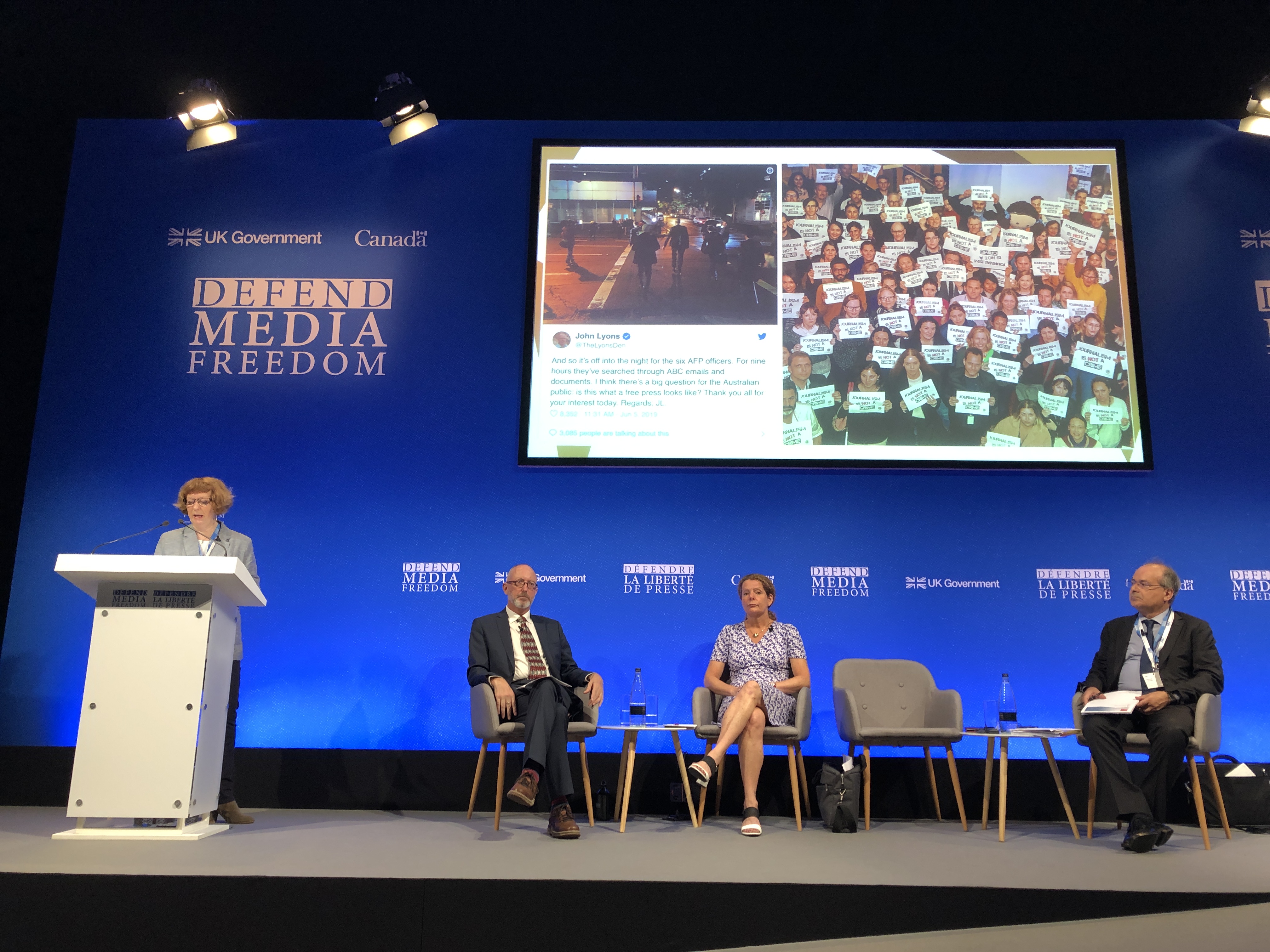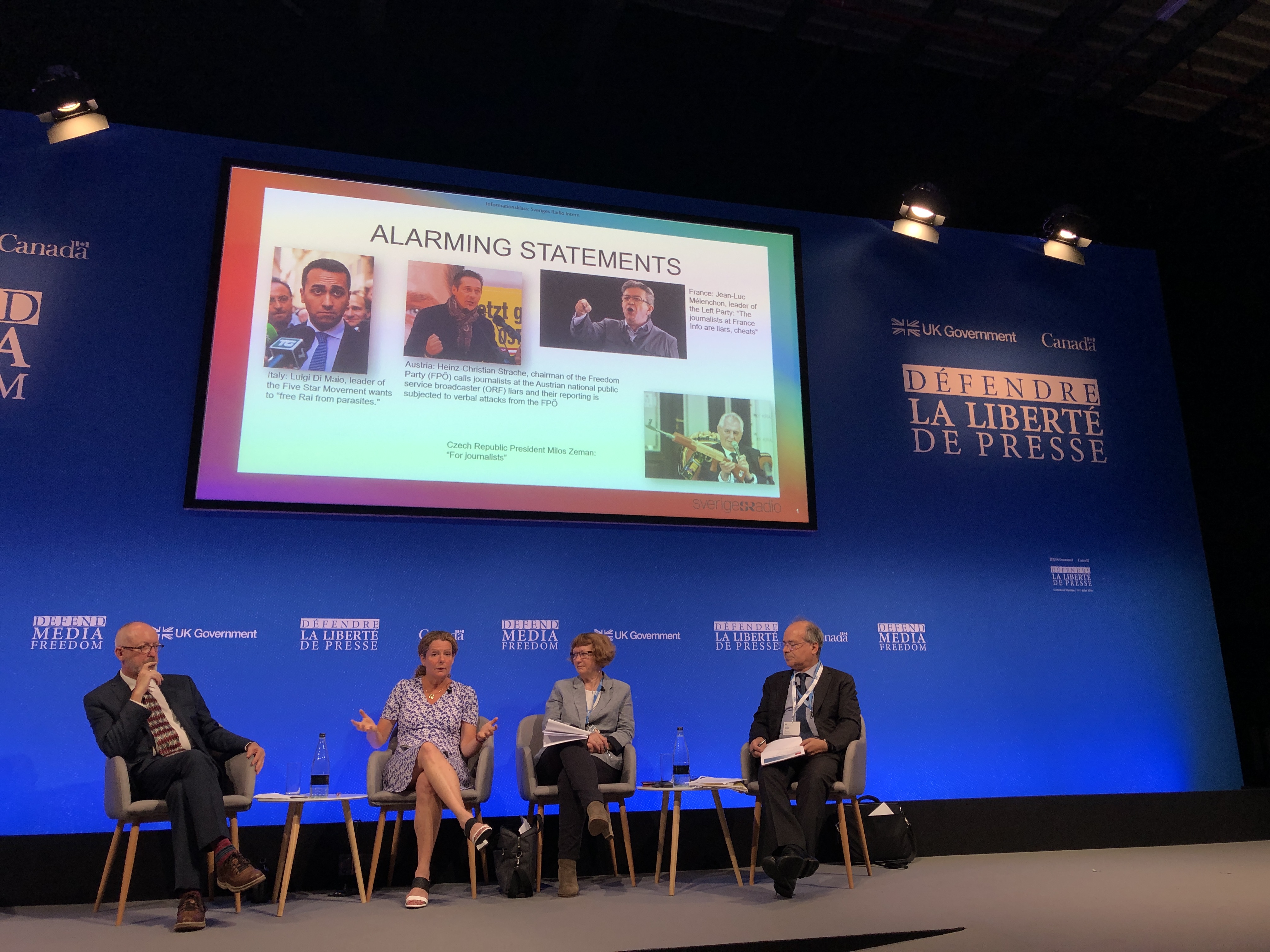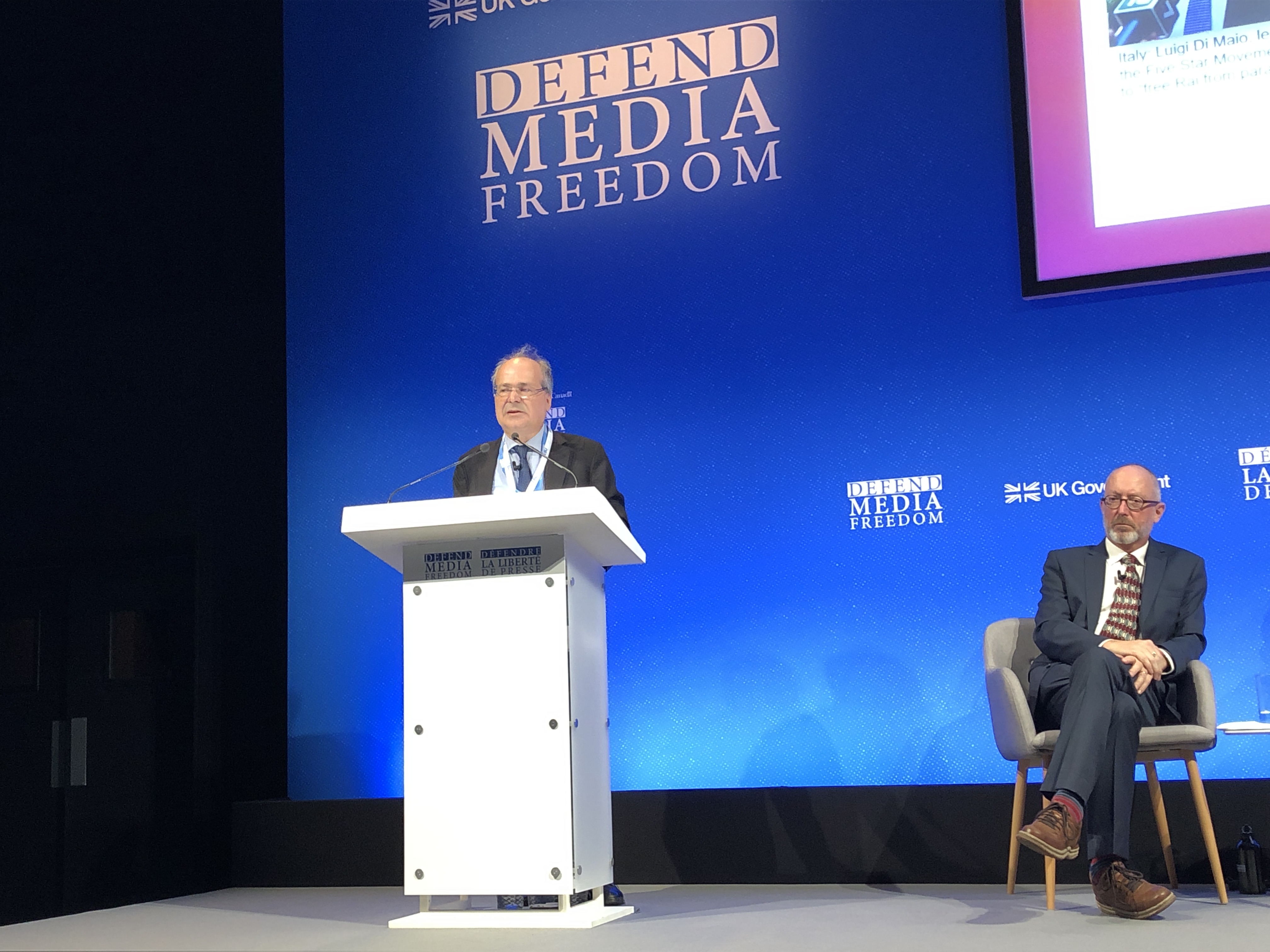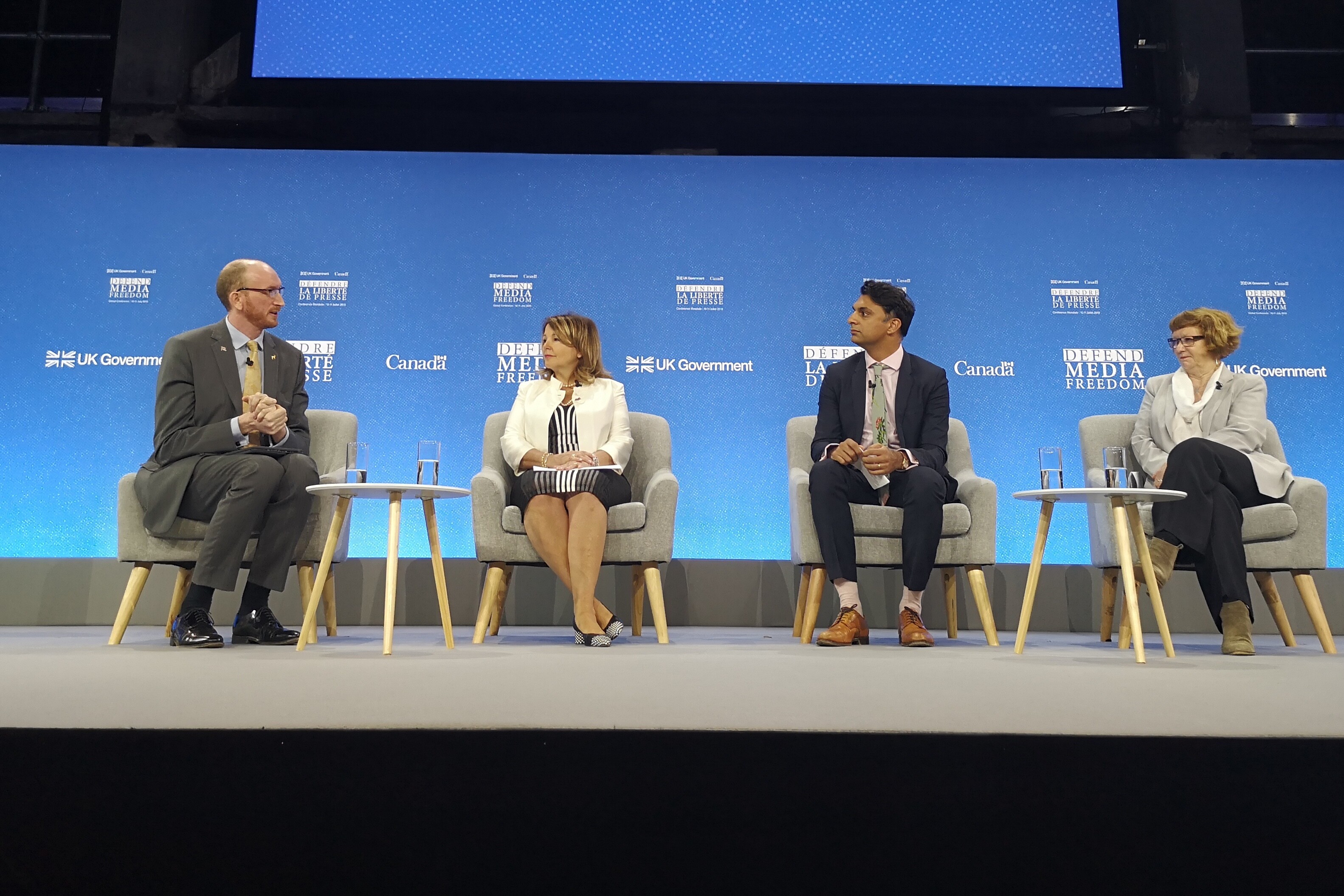Diminished checks and balances, media capture, state interference, funding crises, government hostility, disinformation and the safety of journalists. Never has public media been so important, never has it been so under threat.
These were just some of the issues highlighted at the Public Media Alliance’s (PMA) panel at the Global Conference for Media Freedom on 10 July, co-organised by the UK Foreign Office and Canada’s Department of Global Affairs.
For the thirteenth year in a row, media freedom has been in decline worldwide. And with it, public service media (PSM) face an uphill struggle to maintain their role as a pillar for accountable, trusted and independent news that underpin informed democracy.
Yet this decline is not just a matter for non-democratic regimes and their citizens. From Australia to Central Europe and the US, the pressures and threats are felt worldwide – even in “established democracies”.
This was reflected by our expert panel of speakers, which included: Alan Sunderland, former Editorial Director of the Australian Broadcasting Corporation (ABC); Cilla Benkö, CEO of Swedish Radio; and Giacomo Mazzone, Head of Institutional Relations at the European Broadcasting Union (EBU).
Opening the session, moderator Sally-Ann Wilson, PMA CEO, emphasised the vital role of PSM:
“At its best, public service media is the social glue that builds democracy and shapes our world view,’ she said. “In times of crisis, emergencies and disasters, public media provides people with vital life saving information they can trust. Public service media is not just desirable, it is necessary if we want democracy.”
However, Sally-Ann continued, the trust that is “years in the making, is minutes in the breaking”.

‘Public media builds and supports democracy. The two go together’ – Sally-Ann Wilson on why public media matters
A chilling precedent
Alan Sunderland also drew upon the trusted nature of public media. Despite challenges, ABC has gone from strength to strength in recent years, becoming one of the most popular and trusted source of news in the country. In fact, he says, in every market where there is a public broadcaster, it is the most trusted source of news.
Yet, this has not stopped the public broadcaster from suffering at the hands of the government. Last year, its trusted status was impinged with accusations of government interference at the highest level, while just last month ABC was raided by federal police in response to a report of significant public interest. Sunderland is now concerned that such events will set a chilling precedent for investigative journalism in the country.
And this precedent is being felt worldwide. From the floor, the BBC’s Director of News and Current Affairs, Fran Unsworth, spoke about the need for local governments to support public media and independent journalism, saying: “If governments don’t support independent free media, their own citizens won’t have the information they need to live positive full lives”.
Fran emphasised the added threats of intimidation, shutdowns and physical attacks faced by BBC journalists in Iran, Russia and elsewhere , where even the most well funded public media struggle to report safely. In fact, last year, 99 journalists lost their live according to UNESCO.
Revealing threats closer to home, Cilla Benkö talked about the considerable pressure on PSM by those seeking to control independent public media in some parts of Europe. This includes the use of draconian media laws and hefty fines; the replacement of senior executives with those loyal to the government and the manipulation of employees fearful of losing their jobs; leaders “disparaging independent journalists as tools for foreign interests, calling them traitors”; and the transformation of PSMs into cultural institutions.
From Italy to France and Austria, Cilla Benkö demonstrates the disturbing rhetoric used by some European leaders against journalists.

Funding as control
Speakers also listed funding as a serious concern, with governments using it as their main “weapon of control”. Benkö spoke about the strangulation of financial resources as a major threat to PSM independence as well as the growth of media capture and concentration in parts of Central Europe, particularly by oligarchs loyal to those in power. Sunderland, meanwhile, referred to colleagues in South Africa where the public broadcaster, SABC, is “drowning in debt” and Brazil, where the public broadcaster EBC, is being “taken apart”.
While a devaluation of checks and balances contribute to the crisis, so too does the changing media landscape. All three speakers urged for action to support public media in maintaining their trusted positions in the digital age, to address the impact of changing audience habits and the rise of commercial streaming services.
In an intervention, the Council of Europe’s Deborah Bergamini drew attention to the challenges faced by European public broadcasters: “The more public media relies on public funding, the more interference is to be expected,” she said. “[But] the mixed forms of commercial and government funding then doubles the pressure and that is a real problem.”
Director of the Reuters Institute, Rasmus Kleis Nielsen, also noted the difficulties of public funding, saying that “It is hard to receive and lobby for money impartially” and called for a broader remit fit for a 21st century media environment.
Cilla Benkö offered Swedish Radio as an example of effective PSM funding. The broadcaster is owned independently as a foundation, receives direct public funding through an earmarked tax, supported by by a parliamentary charter that permits no interference by politicians for a cycle of six years. But, she says, innovation and relevance is essential, adding: “We have to realise that we are competing with global digital giants competing for time and if we don’t give [our audience] personal value, they will go somewhere else.” But this, of course, requires supportive institutional and legal mechanisms.

“There’s a clear correlation between strength and independence of public media and participation of citizens in elections and democracy” – Giacomo Mazonne
Reconnecting
In his speech, the EBU’s Giacomo Mazzone spoke of the need to reconnect with audiences: “We have to try to reconnect to part of the young audience that uses social media to go to the 9 o’ clock news,” he said.
Giacomo outlined points to combat key challenges: “Independence matters,” he said. “It is purely instrumental for us as public service broadcasters. It is not a question. If we are not independent the audience, then citizens perceive that very clearly. The second point is social cohesion, if we don’t produce social cohesion, we will not have society as we know today [in the years to come].”
He pointed out the lack of public discourse in the current climate and the need for more debate and space to exchange public opinions. His third point underscored the need for he safety of journalists:
“In a country where public service media do the job properly, this is the best insurance for the life of journalists,” he said. “They are not isolated. They are protected and supported. A country that doesn’t protect journalists, then the benchmark is nowhere and the attacks are easy to contract against journalists.”
In another intervention from the floor, the Rwanda Broadcasting Agency’s Director General, Arthur Asiimwe, made the salient point that in some cases it is about connecting and raising awareness, rather than reconnecting. In Rwanda, where the process of transforming the state broadcaster into a public broadcaster only started 5-years ago it is a matter of ensuring that both their audience and politicians understand value of having an independent public broadcaster. Without “understanding”, he said, “the audience does not demand the government put in place a public media organisation”.
Collaborating for public media and media freedom
So what are the solutions? “Public media needs true independence, declarations of freedom are not enough”, Cilla Benkö said. “There must be legal structures that guarantee that freedom. Long term funding must be secured and a broad remit must be safeguarded. Now, more than ever, [people] have to stand up for public media. It is the lifeblood of free and independent media.”
But, the panel agreed, any solution must be collaborative. “It is Important to discuss problems and link civil society to governments, the crisis we are facing today is of big proportions that cannot be solved by one government, we need to act altogether,” said Giacomo.
For Alan Sunderland, this meant “holding the feet to the fire of governments that say they want to protect it”, with any intervention requiring the backing and support of the public. But in doing so, Cilla Benkö added, a truly representative and inclusive PSM must understand the breadth of public opinion, “friend or foe”.
The challenges facing public media are complex but they are far from isolated. The decline of media freedom on such a wide scale means that support for public media needs to be collaborative and multi-stakeholder. This means including PSM organisations, civil society groups, government and the public alike.
The Global Conference for Media Freedom offered a unique opportunity to start a conversation between all actors, and one that the PMA and our speakers hope will continue far beyond this event.
But action will need more than words. In the coming months the Public Media Alliance will call on partners to join a new initiative to better promote public media and advocate for the critical role it plays in democratic society.
Key moments
The section of the media that belongs to the people, not the government, is being dismantled. From the raids at @ABCaustralia to erosion of independence of #Publicmedia in Central Europe. But it is the most trusted media, it must be protected says @asunderland #DefendMediaFreedom pic.twitter.com/GOJ0PVP2tw
— PublicMediaAlliance (@PublicMediaPMA) July 10, 2019
‘We already know one answer to the question of how to support public interest journalism… Public Service Media’. Alan Sunderland. Former ABC Director #DefendMediaFreedom @PublicMediaPMA pic.twitter.com/GGIBsoAaq2 — Martin Scott (@martinscott2010) July 10, 2019
Do people and governments understand the core values of #PSB around the world? @aasiimwe @rbarwanda #DefendMediaFreedom #PSM #independence #governments pic.twitter.com/LyP319Cqr2
— PublicMediaAlliance (@PublicMediaPMA) July 10, 2019
“We need to be clearer about what the role of #publicmedia is” says @sallyannpma. A greater understanding is key, as is #collaboration. Fruitful discussion in our panel: “Under Pressure: Why public media matters”#DefendMediaFreedom #independence #PSM #PSB pic.twitter.com/pr1bfdhOWq — PublicMediaAlliance (@PublicMediaPMA) July 10, 2019
On closing space for media freedom: we wait too long to act -we sleepwalk to a gradual erosion of media freedom — we need to do something and the defense of PSB should be a high priority – sentiment from panel on why public media matters @ #DefendPressFreedom w/ @PublicMediaPMA
— susan_abbott (@susan_abbott) July 10, 2019
‘Lifeblood of healthy democracy is a independent & free media. Public service represents a set of values; gives a voice to the voiceless & access to culture irrespective of income’ @CillaBenko @PublicMediaPMA #Defendmediafreedom @FCOHumanRights @Global_Witness — rebecca fordham (@rebeccakfordham) July 10, 2019
“We need to be clearer about what the role of #publicmedia is” says @sallyannpma. A greater understanding is key, as is #collaboration.
Fruitful discussion in our panel: “Under Pressure: Why public media matters”#DefendMediaFreedom #independence #PSM #PSB pic.twitter.com/pr1bfdhOWq
— PublicMediaAlliance (@PublicMediaPMA) July 10, 2019
‘We need to check our own privilege when collaborating to support public interest media’. Great point for all the panels at the #DefendMediaFreedom conference, from @sallyannpma at the @PublicMediaPMA panel. pic.twitter.com/PVJCGfhfBe — Martin Scott (@martinscott2010) July 10, 2019
Header Image: ABC workers in Sydney protesting after the June 2019 raid on the public broadcaster. Credit: Brendan Esposito/ABC
